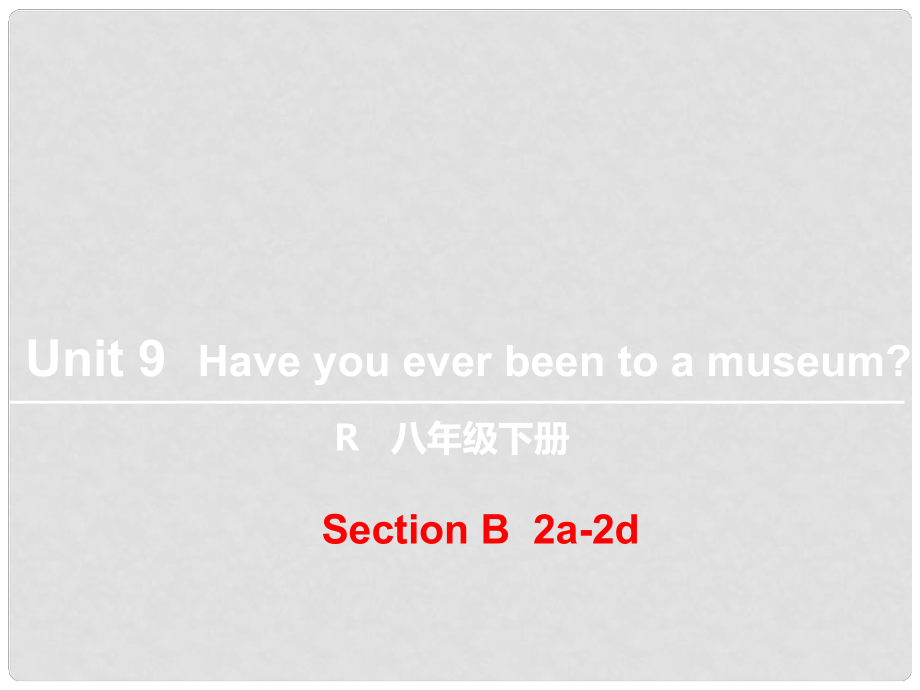《八年級英語下冊 Unit 9 Have you ever been to a museum(第4課時)Section B(2a2b)課件 (新版)人教新目標版》由會員分享����,可在線閱讀�,更多相關(guān)《八年級英語下冊 Unit 9 Have you ever been to a museum(第4課時)Section B(2a2b)課件 (新版)人教新目標版(25頁珍藏版)》請在裝配圖網(wǎng)上搜索���。
1�����、R 八年級下冊Unit 9Have you ever been to a museum?Section B 2a-2dthousand n. 一千一千fear v. & n.害怕�;懼怕害怕���;懼怕Japanese adj. 日本的日本的 n.日本人日本人India adj.印度的印度的n. 印度人印度人spring n.春天春天fox n.狐貍狐貍equator n.赤道赤道What do you know about the country?United KingdomFranceWhat do you know about the country?CHINAWhat do you know
2�����、about the country? 2a. What do you know or want to know about Singapore? Discuss it with your group. What do you know about Singapore?What do you know about Singapore?Reading2b. Read the article. How many reasons can you find for visiting Singapore?2bMaking NotesAfter reading, write down three or mo
3����、re things you have learned. We always remember things better if we take time to reflect.1.Where is Singapore?2. What languages do people speak in Singapore?3.What kinds of food can we eat in Singapore?2bIt is in Southeast Asia.(para1)Chinese and English.(para1) Chinese/Indian/western/Japanese food.(
4��、para2)4. What is the best time to watch animals? Why?5. Why is the temperature almost the same all year round?2b(para3)At night. Because a lot of animals only wake up at night.(para4)Because the island is so close to the equator.Language points1.For thousands of tourists from China,this small island
5��、 in Southeast Asia is a wonderful and safe place to take a holiday.thousands of 意為意為“數(shù)以千計的;許許多多的數(shù)以千計的����;許許多多的”,是個�,是個表示表示模糊概念的詞模糊概念的詞,前�,前不可用數(shù)詞不可用數(shù)詞。而��。而thousand意為意為“一千一千”��,表示���,表示具體數(shù)字具體數(shù)字����,其前要加���,其前要加數(shù)詞或數(shù)詞或a。如:如:There are thousands of people on the street. 街上有成千上萬的人�。街上有成千上萬的人。 There are two thousand students
6���、in the hall. 大廳中有一千個學生��。大廳中有一千個學生�����。Language points2. On the one hand,more than three quarters of the population are chinese,so you can simply speak Putonghua a lot of the time. (1)on the one hand 與與 on the other hand 是英語中常是英語中常見的固定搭配�����,表示見的固定搭配�,表示 “一方面一方面.,另一方面��,另一方面.”��,通常�,通常用于列舉某事物的兩個方面用于列舉某事物的兩個方面。如:如:O
7���、n the one hand����,parents should take good care of their children�����。On the other hand,children should respect their parents��。一方面���,父母用該照顧好孩子����,�����。一方面����,父母用該照顧好孩子,另一方面�,孩子也要尊敬父母。另一方面����,孩子也要尊敬父母���。(2) more than 意為意為“超過�;多余超過;多余”�,相當,相當于于over �����,其后常加�,其后常加基數(shù)詞基數(shù)詞或或表達數(shù)量的詞表達數(shù)量的詞。如:如:He is more than forty years old����。 他已經(jīng)四十多歲了。他已經(jīng)四
8���、十多歲了��。 I have known David for more than 20 years. 我和大衛(wèi)已經(jīng)相識二十多年了����。我和大衛(wèi)已經(jīng)相識二十多年了�。Language pointsLanguage points3. Maybe you fear that you wont be able to find anything good to eat when you travel. (1)本句是個含有)本句是個含有that 引導的引語從句引導的引語從句,be able to 意為意為“能夠能夠”����,相當于����,相當于can���;不定式����;不定式to eat 作不定代詞作不定代詞anything 的后置定語
9����、。的后置定語�����。形容詞修形容詞修飾不定代詞時要放在不定代詞后面飾不定代詞時要放在不定代詞后面����。如:如:I have something new to tell you。 我有新消息要告訴你�����。我有新消息要告訴你�����。Language points(2)fear 是在此是是在此是及物動詞及物動詞����,意為,意為“害怕�����;懼怕害怕��;懼怕”�,其后一般接其后一般接名詞名詞、不定式不定式��、動名詞動名詞或者或者that從句從句��,如��,如fear to offend her或者或者fear offending her或者或者I fear that I may offend her��。如:如:I fear that he is
10�����、 going to die. 我擔心他快死了。我擔心他快死了����。 He fears snakes.他害怕蛇。他害怕蛇�。Language points4. You wont find any problem getting rice, noodles or dumplings. have problems (in)doing s.th 表示表示“做某事費做某事費勁,有難處勁�����,有難處”���,還可以用���,還可以用have no problems(in)doing s.th ,表示���,表示“做某事不費勁��,沒有有難處做某事不費勁�����,沒有有難處”�����。 如:如:I have some problems finding y
11��、ou�。 我費了好些勁才找到你���。我費了好些勁才找到你���。1. What time should I come here tomorrow? Come _ you like. A. however B. whatever C. whenever D. whoever2. The population of Shanghai _ larger than that of Hong Kong. A. is B. are C. be D. have CA3. On _ hand, she is a daughter. On _ hand she is a mother. A. one; other B. t
12、he one; another C. the one; the other D. one ; another4. The population of China _ large. Four fifths of the population _ farmers. A. is ;are B. are; is C. are; are D. is; be CA5.Its the best time _ Beijing in autumn, I think. A. for visit B. to visiting C. to visit D. for visiting6. There are few new words in the article, so you wont have any problem _ it. A. understand B. to understand C. understanding D. understood CC 我認為人生最美好的主旨和人類生我認為人生最美好的主旨和人類生活最幸福的結(jié)果��,無過于學習了�。活最幸福的結(jié)果���,無過于學習了�����。 巴爾扎克巴爾扎克
 八年級英語下冊 Unit 9 Have you ever been to a museum(第4課時)Section B(2a2b)課件 (新版)人教新目標版
八年級英語下冊 Unit 9 Have you ever been to a museum(第4課時)Section B(2a2b)課件 (新版)人教新目標版

